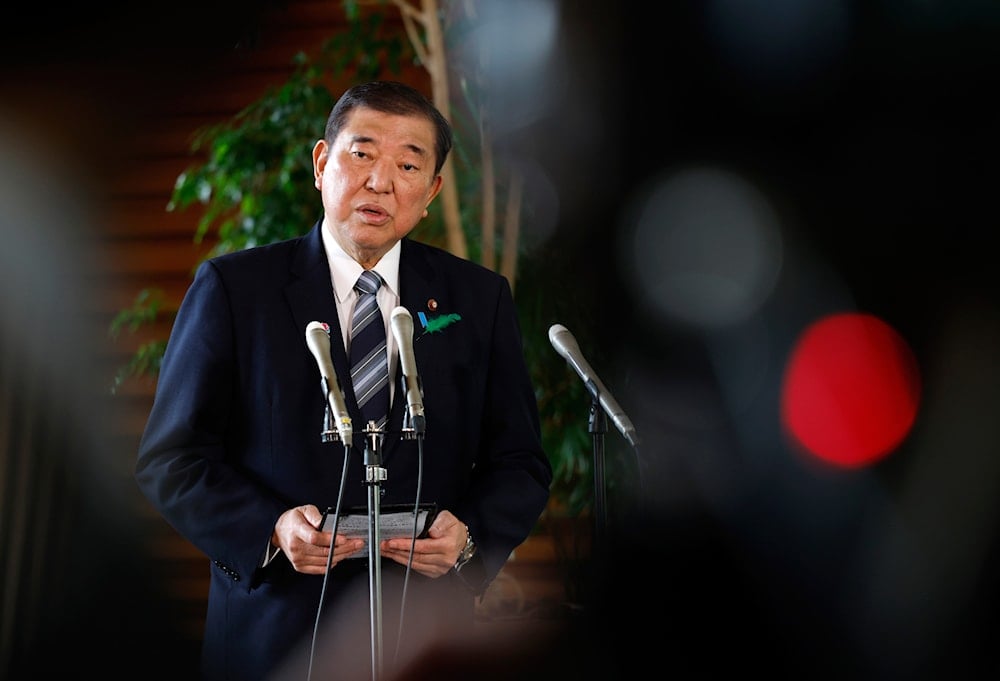Japan PM goes to Vietnam, Philippines to discuss tariffs
Japanese Prime Minister Shigeru Ishiba visits Vietnam and the Philippines to reinforce Japan-Southeast Asia relations amid US tariffs and China's growing regional assertiveness.
-

Japanese Prime Minister Shigeru Ishiba speaks to reporters reacting after a Japanese negotiator held ministerial talks at the White House regarding US tariffs, at the prime minister's office in Tokyo, Japan, on April 17, 2025. (Franck Robichon/Pool Photo via AP)
Japanese Prime Minister Shigeru Ishiba departed on Sunday for a four-day trip to Vietnam and the Philippines, aiming to bolster Japan's Southeast Asia relations in the wake of mounting economic and security challenges.
The visit comes shortly after Chinese President Xi Jinping toured Southeast Asia, as Beijing positions itself as a stable alternative to the United States amid escalating global trade tensions.
Before his departure, Ishiba described Vietnam and the Philippines, along with the broader Southeast Asian region, as a "growth center" driving global economic momentum. However, he noted that these countries are facing "major impacts" due to US President Donald Trump's aggressive tariff policies.
US tariffs' impact on Japan and regional economies
Japan, despite being one of the largest investors in the United States, has felt the strain of Trump's sweeping tariffs. Japanese exports of cars, steel, and aluminium have been hit by steep levies, including a blanket 10% duty. Although Trump has paused his "reciprocal" tariff of 24 percent on Japanese imports, concerns remain.
"We would like to listen carefully to the opinions and concerns of Japanese companies in the region and make use of that in how we deal with the tariff measures," Ishiba stated, emphasizing the need to mitigate the US tariffs' impact on Japan and Japanese businesses operating across Southeast Asia.
Trump has also paused reciprocal duties on other countries, including 46% on Vietnam and 49% on Cambodia, where some Japanese firms have increased production to avoid the fallout from the previous US-China trade war.
Beyond economic issues, Japan-China regional tensions are expected to feature prominently during Ishiba's meetings. The Japanese Prime Minister highlighted ongoing concerns about China's growing aggression in the East and South China Sea.
"There are attempts by China to unilaterally change the status quo by force, and we would like to further strengthen our security cooperation" with Hanoi and Manila, Ishiba said.
The East China Sea has seen dangerous confrontations between Chinese and Japanese patrol vessels around disputed islands, while both Vietnam and the Philippines continue to face tense territorial disputes with Chinese forces in the South China Sea.
Strengthening security cooperation with Vietnam and the Philippines
In response to the evolving regional security landscape, Ishiba is expected to discuss deepening defense ties with both Vietnam and the Philippines.
His efforts aim to reinforce Japan-Southeast Asia relations not only economically but also strategically, in light of shared concerns over China's actions and the need for stability in the region.
This trip underlines Japan's dual focus: managing the effects of Japan's trade policy with Trump and addressing East and South China Sea disputes through collaborative security initiatives with key Southeast Asian partners.
It is worth noting that China’s President Xi Jinping honored the late Vietnamese revolutionary leader Ho Chi Minh on April 15, the final day of his visit to Hanoi, a trip President Donald Trump claimed was intended to "scr*w" the United States.
Xi’s visit to Vietnam was part of a broader Southeast Asia tour that includes stops in Malaysia and Cambodia, as Beijing seeks to present itself as a reliable partner in contrast to Trump, particularly as countries contend with US tariffs.
As reported by Chinese state media, Xi stressed that China and Vietnam must "oppose unilateral bullying and uphold the stability of the global free trade system."
"I don't blame China. I don't blame Vietnam. I don't. I see they're meeting today, and that's wonderful," he said, adding, "That's a lovely meeting... like trying to figure out, how do we scr*w the United States of America," said Trump.

 4 Min Read
4 Min Read










